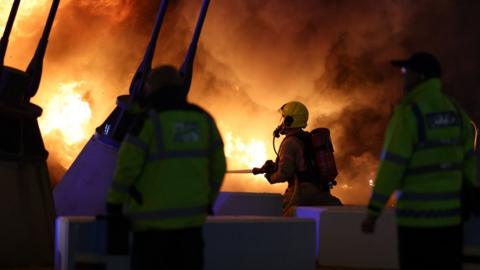Fire Brigades Union general secretary Steve Wright said fire services had already had more than a decade of cuts and the Nics shortfall was coming on top of " yet another below inflation funding settlement".
"If national insurance contributions are not covered fully by central funds, this will further eat into fire service budgets," he said.
"When compared to the police, the cost of covering the rise in national insurance contributions for the fire service is very small, so we urge the government to do the right thing and to avoid another de-facto cut."
Funding for fire services is complex because there are several different types of fire authority split into two funding models - but nearly three-quarters of fire authorities have received direct grants from the government, worth £11.9m overall.
Those direct grants were provided to 31 fire authorities - five authorities run by metro mayors and 26 combined fire authorities (CFAs), five of which have Police, Fire and Crime Commissioners (PFCCs).
The biggest shortfall was 67% in West Yorkshire, followed by 60% in Humberside, and the smallest was 17% in Essex, followed by 32% in Cumbria.
There are 10 more fire authorities where a county council runs the fire service, and Nics grants for the fire service were mixed in with the Nics top-ups for council staff, making the total for just the fire service difficult to untangle.
London and Greater Manchester also have their own structures, where the mayor has overall responsibility for Fire and Rescue services, and funding is again not separated out from Nics grants for council staff.
Budget papers from Greater Manchester Fire and Rescue Services confirmed estimates suggested they could see a 50% shortfall in funding, which "would equate to the cost of one fully-staffed fire engine".
A spokesman for Greater London Fire and Rescue Service said the mayor of London had provided an additional £2.5m top-up funding to cover the £4.4m (36%) shortfall left by the government grant.
